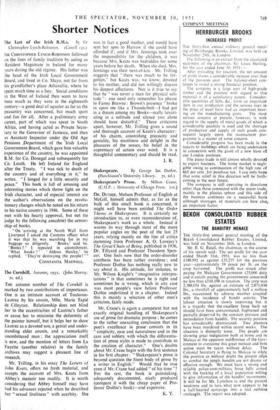Shorter Notices
SIR CHRISTOPHER LYNCH-ROBINSON followed
on t* lines of family tradition by acting as Resident Magistrate in Ireland for many years during the old regime. His father was the head of the Irish Local Government Board, and lived in Co. Mayo, not far from his grandfather's place Athavallie, where he spent much time as a boy. Social conditions in the West of Ireland then seem to have been much as they were in the eighteenth century—a good deal of squalor as far as the peasantry was concerned, but much sport and fun for all. After a preliminary army career, part of which was spent in South Africa, and having acted as Private Secre- tary to the Governor of Jamaica, and then as Assistant Inspector under tie Old Age
Pensions ,Department of the Irish Local Government Board, which gave him valuable experience of the country, he was appointed
R.M. for Co. Donegal and subsequently for Co. Louth. He left Ireland for England after the Treaty. " I was sick to death of the country and of everything in it," he writes. " I longed for a little security and peace." This book is full of amusing and interesting stories which throw light on the Irish character, and of especial interest are the author's observations on the revolu- tionary changes which he noted on his return to his native country in 1946. Some of these met with his hearty approval, but not (to judge by the following anecdote) the censor- ship of books.
" On -arriving at the North Wall from Liverpool I asked the Customs officer what it was that he was searching for in my baggage so diligently. ' Books,' said he. `Books ?,' I repeated in astonishment. ' What books ? " Aldous Huxley,' he replied. 'They're destroying the people! '"
CONSTANTIA MAXWELL.


































 Previous page
Previous page